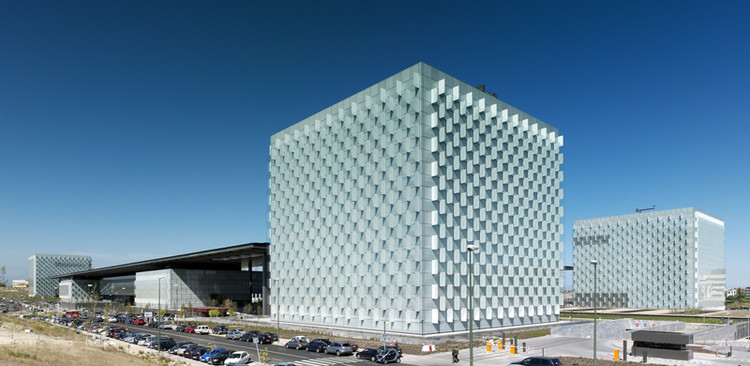RIO DE JANEIRO, BRAZIL – On Wednesday, November 27th, Telefónica announced a profound and quasi-revolutionary organizational change in its structure as a multinational group.
The operator will unify all its businesses in Latin America in a single independent subsidiary (spin off), with the purpose of selling it or taking it to the Stock Exchange, and will focus its investments in its four main markets (Spain, Brazil, Germany and the United Kingdom).

It will also set up a new subsidiary (Telefónica Tech) for digital services businesses such as cloud computing, cybersecurity and the Internet of Things (IoT), and an infrastructure subsidiary (Telefónica Infra).
The decision was reached in Barcelona at a two-day board meeting and, according to José María Álvarez-Pallete, its CEO, it will represent the largest reorganization since he took office in 2016.
As a result, there will be a change in its international structure to focus on businesses with greater projection and more established markets, avoiding those in which political, regulatory and exchange rate instability do not recommend an excess of resources, as is the case of markets such as Colombia, Chile and Venezuela.
The new subsidiary will focus all business the Spanish operator maintains in Latin America, with the exception of Brazil, after the recent sale of subsidiaries in the region (Mexico, Colombia, Venezuela, Chile, Argentina and Peru).

The final fate of this subsidiary has not yet been defined. It will look for foreign partners, alliances to share networks and even the potential sale or an IPO (Initial Public Offering) is not ruled out. It will have its own directorate, led by Alfonso Gómez, currently in charge of Hispam Norte (Mexico), and a wholly independent management.
Pallete conceded that the geopolitical instability in a number of Latin American markets suggests a historic shift in the group’s policy, which has had its main field of growth in the region for decades. “If we have to reduce our exposure and risk in Latin America, we will do so. We haven’t ruled out any options,” he said at a media conference.
“The history of our company cannot be grasped without our 30-year commitment to Latin America, which has made Telefónica a better company. We have always displayed a strong commitment to the region, even in its most difficult times. Until a few years ago, our operations in Latin America were the company’s growth driver.

However, the particular conditions in these markets have had an impact on the evolution of the business, reducing its contribution in recent years for different reasons, despite the enormous efforts of local teams, which have always demonstrated a strong commitment,” added Álvarez-Pallete.
Considerable savings
The full implementation of these measures is expected to generate, among other effects, more than €2 billion (R$9.4 billion) of additional revenue and two percentage points of improvement in the operating cash flow margin (FCO) in 2022.
Currently, Spain, Brazil, Germany and the United Kingdom are Telefónica’s four main markets, out of the 14 in which it operates, with 218.1 million lines (63 percent of the total) and 80 percent of revenues, OIBDA (Operating income before depreciation and amortization) and operating cash flow (OCF).
Therefore, the company’s plan is to prioritize the bulk of its investments in these four markets, improving the offer and services provided to customers, with the leverage provided by the existing relationship with millions of users in relevant markets and with growth potential in this new stage. “In short, to focus resources on the most valuable markets,” the company says.

Under the leadership of Telefónica’s CEO, Ángel Vilá, are the four current directors in these markets: Emilio Gayo (Spain), Christian Gebara (Brazil), Mark Evans (United Kingdom) and Markus Haas (Germany).
Two new subsidiaries
Telefónica’s Board of Directors also agreed to the creation of Telefónica Tech, a unit that will encompass digital businesses with high growth potential, such as cybersecurity, Internet of Things/Big Data and the cloud.
They intend to drive the growth of these activities, which, as a whole, are already experiencing revenue increases of over 30 percent. This unit could be expanded in the future if new business opportunities arise. Similarly, it is open to acquisitions that complement the portfolio, as has been the case in recent years.
Telefónica Tech will incorporate the units currently dedicated to the provision of these services, and this unit will be in charge of providing the offer of value that the commercial teams in each country will provide to customers. In addition, the proposal is intended to be exported to other countries where Telefónica is not present through agreements with other companies.

The unit is expected to generate more than €2 billion (R$9.4 billion) of additional revenue by 2022. José Cerdán will be the CEO of this new company and will be the global head of the B2B segment at Telefónica, reporting to Telefónica’s CEO.
Telefónica Infra will also be created, with 50.01 percent of Telxius as its first asset, bundling Telefónica’s shareholdings in communications infrastructure carriers, delivering service to third-party operators and incorporating partners.
Through this subsidiary, Telefónica seeks to value a unique portfolio of assets, focusing on the development and monetization of towers, distributed antenna systems, data centers, fiber greenfield projects or sub-sea cables, among others.
Telefónica Infra is open to different share ownership models (majority or minority) and to the best partners for each type of asset. In addition, under the command of Ángel Vilá, the CEO of Telefónica Infra will be Guillermo Ansaldo, who has so far led the Telefónica Group’s Global Resources unit.

